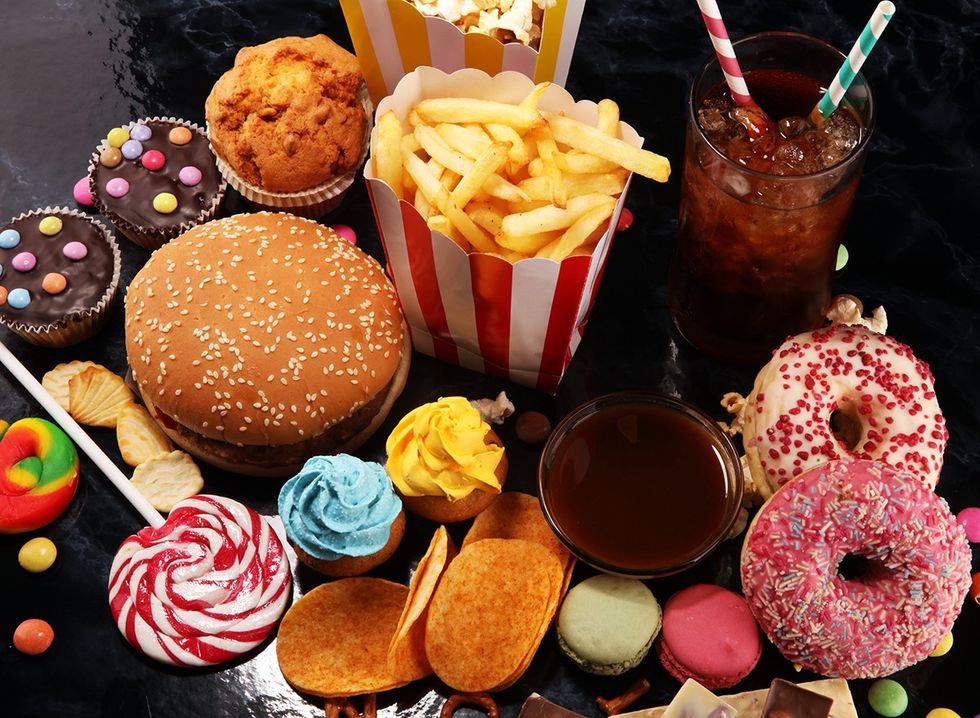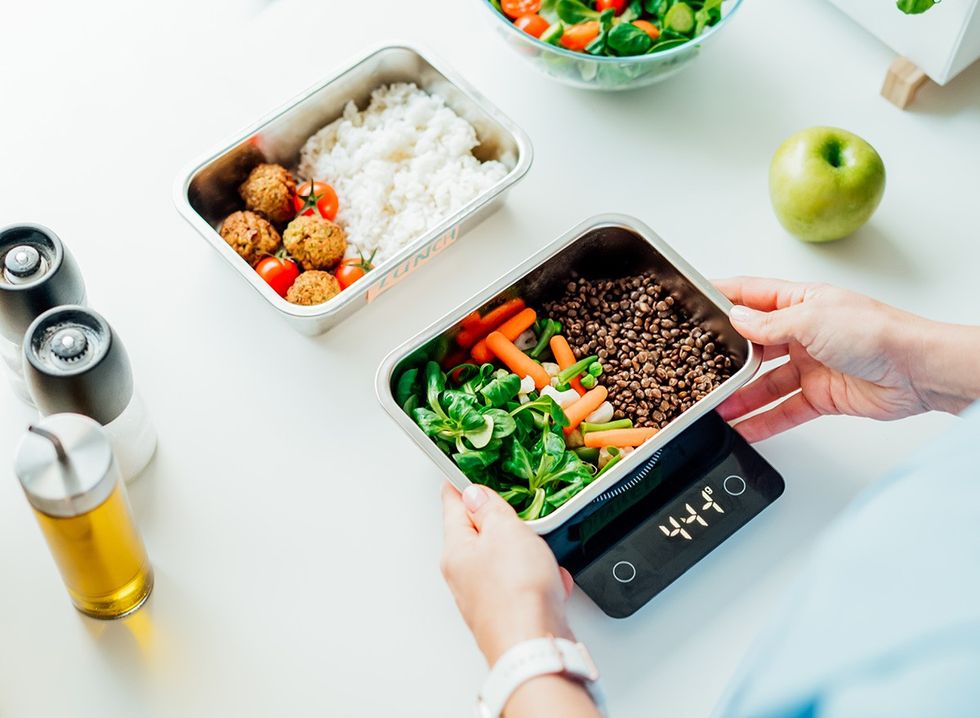Are ultra-processed foods causing you to look and feel terrible? “Health consequences of ultra-processed foods are dire,” preventive cardiologist Stephen Devries, MD, tells the American Medical Association. “The stakes are high because ultra-processed foods are so widely consumed. Recent data shows that 57% of caloric intake in adults comes from ultra-processed foods. For children, it’s sadly even higher, with 67% of their daily calories coming from relatively empty, ultra-processed foods. These alarming statistics go a long way to explain the record-breaking prevalence of obesity, type 2 diabetes, and all of the adverse health consequences that follow.” According to experts, these are the warning signs that you may be consuming too many processed foods.
Weight Gain

Processed foods are terrible for your health and could counter your weight loss. “Ultra-processed foods are the perfect storm to promote overconsumption and weight gain,” says Dr. Devries. “They are laboratory engineered to maximize appeal, are calorie-dense, and have little or no fiber or other healthful nutrients.”
Thirsty All the Time

Processed foods are linked to dehydration. “When it comes to sodium, people often comment they don't put salt on their food,” says the Mayo Clinic. “As it turns out, you don't even need to because manufacturers have already added salt for you — and too much, in fact. The Dietary Guidelines also recommends less than 2,300 milligrams of sodium per day. So look for low- or reduced-sodium foods.”
Constant Headaches

Processed foods could trigger migraines. “Around 5% of people with migraines may develop a headache shortly after consuming processed meat products,” according to West Tennessee Healthcare. “This type of headache has been dubbed a ‘hot dog headache.’ Researchers believe that nitrites, a group of preservatives that includes potassium nitrite and sodium nitrite, maybe the reason why. These preservatives are often found in processed meat.”
Feeling Bloated

If you’re always feeling bloated, processed foods could be to blame. “Many processed foods are high in sodium, which makes your body retain water and can cause your stomach to feel bloated,” Stacy Loudon, ACSM-CPT, tells South Lake Hospital. “Sugary foods and snacks break down in your body and can make you gassy. Even what you drink can upset your stomach.”
Bad Skin

Your diet could be ruining your skin. “If you’re like most Americans, you consume plenty of high-glycemic foods and beverages,” says the American Academy of Dermatology. “These foods and beverages raise your blood sugar quickly. Examples include white bread, corn flakes, puffed rice, potato chips, white potatoes or fries, doughnuts or other pastries, sugary drinks such as milkshakes, and white rice.”
High Blood Sugar

Studies show that heavily processed foods are linked to diabetes. “The risk for developing diabetes went up 15% for a 10-percentage-point increase in the amount of ultra-processed food in the diet,” says Harvard Health. “The connection held up even after scientists accounted for known risk factors for diabetes, such as weight and physical activity. The takeaway: Skip processed foods in favor of whole foods, including lots of vegetables, fruits, legumes, and whole grains.”
High Blood Pressure

Studies link processed foods to high blood pressure. “There is a wealth of research indicating the many negative implications a diet high in ultra-processed food can have on our health,” says Professor Graham MacGregor, Chair of Blood Pressure UK. “This is an important study that shows specifically how ultra-processed food can have a direct impact on our blood pressure. These findings further emphasize the importance of eating a healthy, balanced diet that’s high in fruit, vegetables, and whole grains, low in salt, and with a minimal amount of ultra-processed food.”
Tired All the Time

Consuming too much ultra-processed foods can lead to constant fatigue and low energy. “If you experience an afternoon slump or just feel tired a lot of the time despite getting enough sleep, it’s possible your eating habits are contributing to low energy levels,” Samantha Cassetty, RD, tells TODAY. “Heavily processed and sugary foods are some of the biggest dietary culprits that can lead to fatigue.”
Bad Sleep

Ultra-processed foods are linked to poor sleep quality. “Researchers found that eating an unhealthy diet high in processed food can affect people's deep sleep (also known as slow-wave sleep),” according to Harvard Health. “During this sleep stage, the pituitary gland in the brain releases a burst of growth hormone, which helps build and repair muscles, bones, and other tissues.”
Always Hungry

Ultra-processed foods are usually devoid of essential nutrients and are designed to be over-consumed. “Unbeknownst to many people, the foods we buy have a lot of toxic additives lurking in them,” Amy Shah, MD, tells CNBC. “This means they’ve been altered in ways that actually make you hungrier and hijack the brain to worsen your emotional eating habits.”
Bad Teeth

Processed junk food is terrible for your oral health. “If you are what you eat, that's even more true for your teeth and gums,” says the University of Rochester Medical Center. “When you drink and eat starchy or sugary foods, you're not only feeding yourself. You're also feeding the germs (bacteria) that can cause tooth decay and gum disease in your mouth.”
Your Hair Is Falling Out

Good nutrition is important for healthy, strong hair. “Consuming adequate vitamins and minerals is important to preventing and managing hair loss,” Jennifer Fisher, MMSc, PA-C, tells Harvard Health. “Most people can cover all their nutritional needs through a healthy, balanced diet.”
You’re Depressed

Research shows consuming ultra-processed foods is linked to a higher risk of developing depression. “This is no surprise. There is a connection between our mood and the foods that we eat,” Susan Albers, PsyD, tells the Cleveland Clinic. “What we eat every day is a daily investment in how we feel.”
High Cholesterol

Ultra-processed foods are linked to high levels of bad LDL cholesterol levels. "What it really all boils down to is that you shouldn't eat fake food — things that don't rot, packaged items full of added sugar, and foods with ingredients you can't pronounce." Dr. Joshua Septimus tells Houston Methodist. "I think a lot of people don't realize that insulin resistance and high cholesterol are linked. If you eat a lot of processed foods, particularly sugar-sweetened beverages, that will drive your cholesterol up."
Fertility Issues

Research shows consuming too much processed food can negatively impact your fertility. “If your diet consists mostly of fast food, sodas, processed meats, and refined carbs, you may want to make some changes,” according to UNC Fertility Clinic. “Consumption of sugar-sweetened beverages (like sodas) has been linked to lower fertility for both men and women. Additionally, studies have shown that women who consume large amounts of fast food and little produce can take longer to become pregnant than women with healthier diets.”
Digestion Problems

Consuming too much ultra-processed food can impact your gut health. “Ultra-processed foods contain large quantities of saturated fat and trans-fat, added sugar, salt, and food additives that seriously affect the gut and physical health,” gastroenterologist Preeya Goyal tells PIH Health. “Since the body doesn’t have to do much to digest the food, the gut readily absorbs things like sugar, which can cause spikes in blood glucose levels when digested quickly.” And if you enjoyed this article, take advantage of these 15 Quick Ways to Lose Body Fat Percentage in a Week.














 Shutterstock
Shutterstock Shutterstock
Shutterstock Shutterstock
Shutterstock Shutterstock
Shutterstock Shutterstock
Shutterstock Shutterstock
Shutterstock Shutterstock
Shutterstock Shutterstock
Shutterstock Shutterstock
Shutterstock

 Shutterstock
Shutterstock Shutterstock
Shutterstock Shutterstock
Shutterstock Shutterstock
Shutterstock Shutterstock
Shutterstock Shutterstock
Shutterstock Shutterstock
Shutterstock Shutterstock
Shutterstock Shutterstock
Shutterstock Shutterstock
Shutterstock Shutterstock
Shutterstock

 Shutterstock
Shutterstock Shutterstock
Shutterstock Shutterstock
Shutterstock Shutterstock
Shutterstock Shutterstock
Shutterstock Shutterstock
Shutterstock


 I'm a Nutritionist and These 9 High-Protein Snacks Keep My Clients Full While Losing 50 Pounds
I'm a Nutritionist and These 9 High-Protein Snacks Keep My Clients Full While Losing 50 Pounds
 Shutterstock
Shutterstock 2. Processed FoodsShutterstock
2. Processed FoodsShutterstock Shutterstock
Shutterstock Shutterstock/Prostock-studio
Shutterstock/Prostock-studio Shutterstock
Shutterstock Pro TipsShutterstock
Pro TipsShutterstock Shutterstock
Shutterstock Shutterstock
Shutterstock Shutterstock
Shutterstock Shutterstock
Shutterstock Don’t Drink as Much AlcoholShutterstock
Don’t Drink as Much AlcoholShutterstock Most Women on GLP-1s Are Making a Few Common MistakesShutterstock
Most Women on GLP-1s Are Making a Few Common MistakesShutterstock Soda and Sugary DrinksShutterstock
Soda and Sugary DrinksShutterstock Shutterstock
Shutterstock Eat BreakfastShutterstock
Eat BreakfastShutterstock And Improve Insulin SensitivityShutterstock
And Improve Insulin SensitivityShutterstock Belly Flab Strip Tip: Sugar and Fat Calories Leave Its Mark on Your BodyShutterstock
Belly Flab Strip Tip: Sugar and Fat Calories Leave Its Mark on Your BodyShutterstock Shutterstock
Shutterstock The Drugs Mimic the GLP-1 Hormone Naturally Produced by the BodyShutterstock
The Drugs Mimic the GLP-1 Hormone Naturally Produced by the BodyShutterstock 3. Deep-Fried ItemsShutterstock
3. Deep-Fried ItemsShutterstock